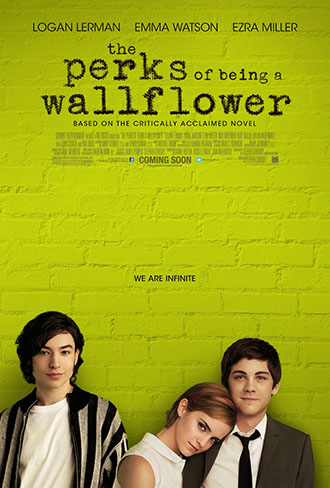Review: The Perks of Being a Wallflower—A look at the darker side of adolescence

“I feel infinite.” This is what Charlie tells his two new friends as they are driving too fast to Charlie’s first real party with David Bowie’s “Heroes” blaring from the stereo in The Perks of Being a Wallflower.
All of the chaos, energy and anxiety of adolescence is eloquently portrayed by director Stephen Chbosky, adapting his own novel for the big screen. Anyone who’s not familiar with Chbosky’s novel might expect the movie adaptation to be the usual type of sentimental and kitschy film that teenage dramas typically are. Brace yourself. The Perks of Being a Wallflower explores a darker side of adolescence and does so without being overly sentimental or simplified.
The film follows Charlie (Logan Lerman), a quiet, painfully shy and precocious loner. He’s starting high school while still dealing with the suicide of his best friend and a traumatic childhood experience that has overshadowed his life. Believing himself to be a perpetual outsider, Charlie has more or less disconnected from the real world, taking refuge in books and music.
During a football game, Charlie does something uncharacteristically brave: he sits down next to an older student, the witty and loudmouthed Patrick (Ezra Miller) and strikes up a conversation with him. Patrick is immediately welcoming and introduces Charlie to his free-spirited stepsister Sam (Emma Watson) and their group of smart, artsy friends. Sam, Patrick and their friends revel in their nonconformity, and for once Charlie almost feels like he belongs.
Although Charlie is intellectually mature, he’s endearingly naïve. Sam and Patrick try to guide Charlie through his freshman year while introducing him to punk music, parties and The Rocky Horror Picture Show. Patrick especially understands Charlie and lets him be himself, while carefully nudging him outside of his comfort zone just enough to make him see who he can be.
Charlie can’t shake the feeling of being an outsider until he’s forced to really participate in his life, transforming him from the titular wallflower into his own person.
The film benefits from a tight, compassionate script and a near-perfect cast, especially the three teenage leads. Lerman exhibits such sensitivity and innocence on screen that it’s heartbreaking to watch. Watson likewise gives a stunning and touching performance as Sam. But Miller, who plays Patrick, steals every scene. The warmth and ebullience he exhibits is infectious.
The film manages to capture both what your teenage years feel like when you’re in them, and what they feel like when you look back on them. It differentiates itself from typical coming of age films by being deeper and more authentic. There are a lot of darker elements to the film, but it’s still very witty and funny.
At its core, it is a movie about becoming an individual and recognizing that the bonds formed with others are the most meaningful parts of life.
